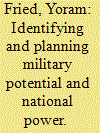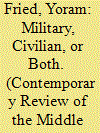|
|
|
Sort Order |
|
|
|
Items / Page
|
|
|
|
|
|
|
| Srl | Item |
| 1 |
ID:
190454


|
|
|
|
|
| Summary/Abstract |
Research on the military potential/national power has focused on features such as numbers of soldiers, the military budget, population size, industrial production, technology, and others as underlying national power. The geopolitical situation of the State of Israel made the IDF General Staff the arbiter of any planning decision related to the development of the state economy, and responsible for planning and directing national security. Because the asymmetry between the military potential of the Arab countries and that of Israel was a reality on the ground that Israel’s national security concept had to take into consideration, and because modern warfare is between nations, their material forces and their mental capacities, the Israel Defence Forces [IDF] recommended setting up civil–military Planning Units based on military guidelines to identify, calculate and plan specific areas of national potential such as administration and regime, morale and education, static defence, the economy in wartime, and manpower.
|
|
|
|
|
|
|
|
|
|
|
|
|
|
|
|
| 2 |
ID:
174371


|
|
|
|
|
| Summary/Abstract |
Over the years, attempts to define the notion of national security in terms of what it means and what it represents have ranged from a classical, purely military definition, to a broader multidimensional concept encompassing a range of different features. Studies on Israel’s national security concept have tended to emphasize the formative role played by David Ben-Gurion, Israel’s first prime minister and defense minister. These works have focused on the military aspects of the national security concept, based on arguments concerning the perceived threat of wartime engagements with Arab armies. This article argues that Ben-Gurion’s national security concept was essentially a civilian perspective with military features that responded to the four types of threats, local, regional, international, and Jewish, facing the State of Israel at the time, most of which were not military.
|
|
|
|
|
|
|
|
|
|
|
|
|
|
|
|
|
|
|
|
|